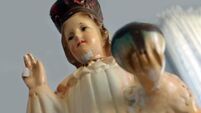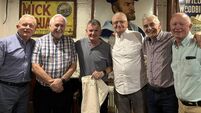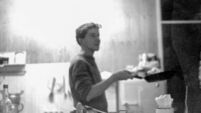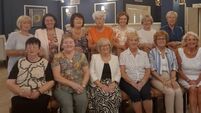Late summer in Cork means ... it’s black-ahs time

Blackberry picking at Pouladuff, Cork in 1951.
THE picture we ran last week, in Throwback Thursday, showing the old-fashioned swing boats, sparked interest from John O’Mahony, now residing in the UK.
“That is quite a contraption in the ‘merries’ photograph this week. The swing boats not only swinging but revolving around the cranked axle they are suspended from would give the present-day health and safety brigade coronary spasms all around!
“Interesting too that the old pole ladder (also outlawed now) is leaning against the A-frame; probably there for on-the-spot, running repairs and adjustments. How things have changed.”
Yes, when you look back, quite a few things we took for granted in childhood were probably distinctly dangerous. Some of the typical games and adventures quoted by contributors to this page over the past year or so would certainly fit into that category. Remember somebody sliding down snowy slopes in Goulding’s Glen on an old car door? Or running a ‘trolley-wagger’ down Cork city hills, with no thought of any kind of brake?

Come to that, climbing trees to snatch apples, clambering over rooftops just for fun, playing football on the street – all of these practices would now be definitely forbidden for today’s carefully cosseted children.
Were we worse off or better? Did it matter that we came home with grazed knees and bumped heads? Wasn’t it a good idea to get exposed to at least some of the hazards of everyday life instead of being sheltered from every wind that blew?
Those memories of Youghal recollected by Tim Cagney last week resurrected some other childhood holiday memories from Ger Fitzgibbon.
“I used to stay down in Crosshaven sometimes with my cousins, in a small but quite fancy timber bungalow, built by my grandfather and owned by my grandmother, on Camden Road, looking across at Cobh. I can still see that linoleum floor, made sandy from our feet, shoes, sandals, togs etc.
“Then, waking up to the weird mooing sound of Roches Point fog-horn which meant you knew before you got out of the top-and-tail bed that it was going to be a muggy, soggy, misty kind of day and that you’d spend a good deal of it under Aunt Betty’s feet, playing cards with cousin Niall on the lino floor of the living room.”

That mention of top-and-tail beds should bring back memories to other readers. When space was tight, as it inevitably was in seaside bungalows, children were tucked in at either end of a single bed, and threatened with doom if they misbehaved by kicking or pulling blankets off the other occupant.
Ger also recalls heading to Graball Bay for playing in the water.
“I never learned to swim properly, as my father - who was not a swimmer - insisted on trying to teach us, but had some strange theory that you could swim and keep your face out of the water at the same time. Perhaps the large sewage pipe in Graball may have influenced his thinking…”
Certainly the beaches from which we all swam in those days left a lot to be desired – to put it tactfully, very few of them would have achieved Blue Flag status back then. But what did we know of Blue Flags? We were there for the fun, and the sand, and to see who had the courage to “get down” first into what was always and ever icy, freezing, water.
In later years, going abroad was a revelation for so many Corkonians reared on the unforgiving Atlantic waves. They discovered, incredulously, that there are other parts of the world where the water is actually warm, kind, encouraging to bathers! Who knew? Certainly not those of us who first paddled off Graball Bay.
What else does Ger remember?
“Learning how to use broken-off barnacles and string to catch crabs in the rock-pools. Discovering that, for some strange reason, shrimps and crabs and such didn’t really survive very long in luke-warm jamjars of water on the window-sill.
“Going to the Merries, and hearing the sounds of Slim Whitman (Oh Rose-Marie, I Looove You) echoing around the bay, punctuated by the whine and crash of the bumpers. The cousin and myself waiting behind my Aunty Betty as she queued up at the strange hut opposite the Merries for chips. A bizarre ritual where they obviously didn’t trust the customers with things like salt and vinegar. They took orders (‘that’s three fourpennies with, and two sixes without...’) in a way that almost sounded like a prayer-chant. Then they disappeared into the back of the hut and emerged five minutes later with a big wooden tray of fours and sixes, and began the massive haggle with the pushing crowd as to who ordered what.
“Moving the newspaper of chips from hand to hand because it was too hot but not being able to resisting the roasting salty chips as we shivered in our shorts and jumpers and the darkness closed around us.... “
Yes, there was a savour to chips served up in newspaper, Ger, that has not been equalled since. Perhaps it was something to do with the printing ink. No, more likely it was because we knew it was either the Examiner or the Echo, and if we were careful with the wrapping, we could read interesting little titbits to each other on the way home, peering underneath the greasy stains and brushing away the salt.
“Then my parents got notions. They rented a small house in Youghal for a week. It rained the whole time. It was awful. Then they tried Ardmore. That was brilliant. I loved it. The family stayed down for a month with my dad commuting at weekends until his holidays allowed him to stay down. There were three or four families who hung out together, kids of all ages. The house we stayed in when we first went down had no electricity. It was all oil-lamps and candles and cooking on a range. I thought it was brilliant. It even had a wind-up gramophone.”
Ardmore was (relatively) undiscovered at the time, he recalls.
“I think it was too far west for the Waterford people and many Cork people were put off by the challenge of the old Youghal Bridge. (For reasons I have never quite fathomed, the bridge was deemed too flimsy for regular traffic at normal speed so they had put in tar-barrels and barriers so you had to drive slowly and zig-zag your way across.)”
Ah yes, that famous Old Youghal Bridge. This writer remembers being terrified making that slow crossing, as paterfamilias would cheerfully speculate if we would make it over before the whole thing collapsed. Today of course there is a strong new bridge, capable of taking any weight, further upriver, but if you look out, you can still see the piers at both ends of where the old bridge once spanned the Blackwater.
Ardmore had everything, remembers Ger enthusiastically.
“There was a huge strand, a round tower, fishing boats, a pier, old guys who’d tell you stories, occasional storms, another strand (Whiting Bay) you could walk to and pick blackberries on the way, even shoals of mackerel from time to time... It had St Declan’s Well and it had Halla Deaglan - a dance hall with a corrugated iron roof on the main street.
“Young fellas like us were let in free early on a Saturday night and our job (job! I ask you) was to skeet up and down the dance-floor rubbing soap crystals into it so it would have a good polish for the grown-ups (my older sisters) later on.
“The house we stayed in was belonging to a couple called Rooney, and when we were whooshed off to bed, we’d lie there hearing the thump-thump-thump of the drummer across in Hall Deaglan. I caught my first mackerel down in Ardmore, to my delight and my mother’s horror (she hated cooking fish). We all got sunburned. (At the time this was regarded as a necessary stage in the acquisition of “a good colour.” It involved pain, blisters possibly, calamine lotion, peeling and a repeat of the exercise until your skin was sufficiently leathery to deal with the weather. And once every summer there was an outing to a place called Goat Island. The whole village turned out and made a day of it, all to watch some local volunteers test out their breeches-buoy rescue equipment by shooting a rocket over the island and (theoretically) winching a poor shipwrecked person from the island to the mainland. The thing never really worked but it was exciting.”

Ger mentions walking to Whiting Bay. (Did you know that this was the original river mouth for the Blackwater? After a violent storm many centuries ago, it changed its course and went down to the sea where Youghal would eventually develop.) On the way, he says, they picked blackberries. Now picking black-ahs was always part of the late summer tradition in the Cork of our childhood. What happened to it? Don’t today’s parents know how to make jam or those delectable blackberry pies?
This writer was out and around in the country lanes last weekend and saw hedges so heavy with ripe juicy fruit that she ran out of plastic bags to put them in. But nobody else was picking them! And in case you’re thinking that not everybody goes out into the country, how about that patch of waste ground between Douglas Village and Douglas Court shopping centres? That’s full of ripe blackberries ready for the gathering right now, but nary a sign of anyone going in to get them. Wouldn’t be surprised to hear that nobody gathers apples either these days, whether legally or illegally. Apple crumble, baked apples, pies, jelly… what’s become of us that we buy these products, ready-made heaven knows where, from a chain of supermarkets instead of making our own? Even the claim that you can’t make good pastry doesn’t excuse you – most of those supermarkets sell ready-made pastry too. Listen, your grandmother, your mother, all made pies, cakes, jams, jellies. Back in the Fifties they had to. Who was going to buy something for good money from a shop when the real thing, tasting of the countryside, could so easily be made at home?
We well remember that back in the ’40s and ’50s Cork kids would go out for the whole day gathering blackberries, utilising those big tin cans which had originally held boiled sweets, and take their fruit to Ogilvie & Moore’s, the jam makers near Parnell Place. Now we know that isn’t there any more, but with the cost of living spiralling upwards by the day, isn’t it just about time we went back to a few of the old ways? Gather our own fruit, make our own supplies? You will see them still doing it in most Eastern European countries. They know the value of home economy and home-made provisions.
“There is nothing like seeing full shelves in the pantry,” an Estonian woman told me once. She was gazing proudly at the serried ranks of jars shining brightly, each echoing happy days of collecting, and promising happy meals to come in the winter months.
Still gather blackberries? Remember freezing swims from childhood? Share your memories, email jokerrigan1@gmail.com or comment on our Facebook page: https://www.facebook.com/echolivecork.







